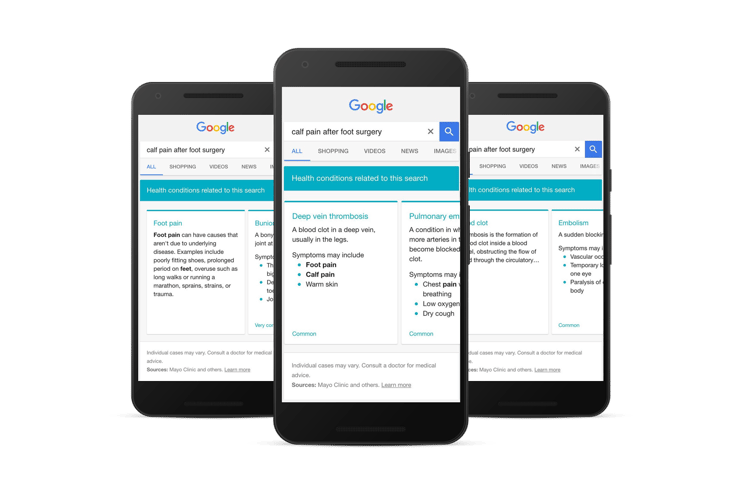Google’s Symptom Search is revolutionizing the patient path to treatment, and doctors should embrace this development as an opportunity to provide better care, rather than as a threat to their credibility.
This past week, I was catching up with a friend who told me about a recent life-or-death situation he found himself in.
He had just undergone foot surgery to take care of bone spurs — a pretty standard procedure that offers little cause for concern. After returning home, he found himself experiencing calf pain, yet being the type to grin and bear it, he just decided to ignore it. But soon enough his pain became too intense for even him to hide and his wife grew increasingly concerned.
She decided to join her husband for his post-op appointment with the doctor, assuming he would downplay the severity of his pain. Just as she expected, my friend acted as if nothing was wrong, and the doctor unsurprisingly sent him on his way. Luckily, she had the wherewithal to whip out her phone and do a Google search on calf pain after foot surgery before they left the office. Her search resulted in multiple possibilities: foot pain, bunion, Deep Vein Thrombosis (DVT), blood clot, and embolism.
After filtering through the options Google presented, she determined that a blood clot could be a major risk to her husband, so she dragged him back into the exam room and asked the doctor if DVT (the technical term for a blood clot in a vein typically found in the leg) was a possibility. With a roll of his eyes, he agreed to give the leg another look. After further examination, the doctor sent my friend to the hospital for a more in-depth evaluation, and what do you know? Scans revealed a blood clot in his leg.
Given a few more days without treatment, my friend could have easily had larger concerns than calf pain or bone spurs. He was running the risk of losing the leg or even his life. Thankfully, his wife’s intuition and the resources available while performing a search on Google saved him from a potentially harrowing affair. Once we knew he was going to be alright, my interest immediately turned to her experience with the search process — after all, I’m in digital marketing.
Google Symptom Search and the Patient Path to Treatment
Google’s decision to roll out “symptom search” comes as a direct response to key changes that have occurred in the patient path to treatment over the past decade or so. Recent data shows that 43% of consumers rely on the internet as their go-to resource for health-related information — far more than the 14% of people who claim they first turn to doctors. What’s more, the volume of online health queries is rising at a rate of roughly 7% per year.
However, the massive amount of unfiltered, unsubstantiated information available — thanks to sites like WebMD and a growing number of online forums — have made the search for accurate medical advice incredibly difficult. As a result, patients are more likely to stumble across alarmist diagnoses or, conversely, overlook a serious condition.
Symptom search represents a big step forward in the fight against misinformation in the digital patient path to treatment. Currently available only on mobile, the feature allows users to enter just a few symptoms, yielding a short, vetted list of related conditions, possible causes, and treatments. It’s designed to avoid alarmist diagnoses while focusing on the most likely causes of your condition.
According to Google’s blog, it intends to help users “quickly get to the point where [they] can do more in-depth research on the web or talk to a health professional.” With more and more patients going online to conduct their own research at the first sign of illness or injury, a streamlined, accurate service like Symptom Search is a welcome addition to a previously convoluted patient journey.
Consumer-Driven Disruption in Healthcare
Of course, symptom search isn’t the only development to emerge out of this shift in the “balance of power.” Digital optimization and on-demand services have become a baseline expectation for consumers in all aspects of day-to-day life (think Uber, Seamless, even Tinder). As a result, the healthcare industry has found itself with little to no say in the matter.
Back in the 1930s, nearly 40% of doctor visits were at-home, but by the early 1980s, the practice had effectively vanished. Today, the massive proliferation of one-touch, on-demand smartphone services are forcing doctors to bring back the personalized approach — or risk losing patients to others who are more flexible and willing to embrace this trend. As a result, we’ve seen the emergence of the “Uber-ization” of medical appointments. Companies like Heal, Dispatch, Pager, and MedZed have already been making waves with app-enabled house and in-office calls.
Similarly, remote patient monitoring technologies and startups have taken off in recent years — for example, BeWell Connect, a subsidiary of Viseomed, is leveraging cutting-edge technologies in order to improve the quality of life for patients with conditions that require ongoing monitoring from a physician or specialist. Its wide range of devices, from thermometers to blood sugar meters to health and fitness trackers, are all connected and managed through a single, intuitive app. This provides seamless access to vital health information for the entire family, helping patients and caregivers stay one step ahead of health-related issues without having to take on the often untenable cost and time burden of regular in-office visits.
Personal opinions and political leanings aside, recent legislation has also reflected this trend towards a consumer-centric healthcare industry. For example, portions of the Affordable Care Act, such as price transparency requirements and the institution of an online, open-access marketplace, come as a direct response to consumer demand for increased personal control. (See also the federal government’s $30 billion push for electronic health records in 2009).
Here’s a brief glimpse at some of the key markets in which this consumer-driven disruption has already had a demonstrable impact:
- Consumers have overwhelmingly embraced the wearables and connected devices market, purchasing these products by the millions to improve their overall health and well-being. The wearables market grew to $12.6 billion in 2015, and is predicted to hit $95.3 billion within the next five years.
- The remote care and patient monitoring technologies markets are booming. Today, 84% of 18-34-year-olds would prefer a mobile-mediated consultation to an office visit, and there will be three million remotely-monitored patients by 2019. Moreover, the remote monitoring tech market is expected to reach $20.9 billion by the end of this year.
- Demand for increased efficiency and price transparency has prompted a surge of venture capital investment into disruptive digital health and biotech startups. Funding topped $16 billion last year, up 34% from 2014.
- 95% of consumers demand online access to health records, says Accenture, driving cloud adoption and making software a “core competency” for medical companies. In fact, 82% of small practices in urban areas have already switched over to cloud-based EHR systems. What’s more, the widespread interconnection of medical devices could save healthcare $30 billion annually.
Embracing Change
Importantly, this apparent shift in the “healthcare power structure,” and the tools that have emerged as a result (i.e., Symptom Search) will never fully negate a medical professional’s expertise or authority, nor are they designed to. However, as my friend’s story shows, digital technologies and services can be an invaluable preliminary resource for today’s increasingly “active” patients.
Moreover, the canon of medical science is simply too expansive for any one doctor to maintain an encyclopedic knowledge of every last condition. As such, doctors shouldn’t resist these changes — rather, they should approach them with open arms, recognizing that such developments can actually help improve the accuracy of diagnoses and enhance the overall level of care.
One proponent of this idea, Dr. Bobby Ghaheri, recently published a post on his Facebook account outlining a conversation he had with a patient who had conducted his own research online and actually taught him a lesson.
As he tells it, the two of them share a rare condition, and his patient was the first to inform him about cutting-edge research on the topic. As Dr. Ghaheri declares, “No longer will parents and patients just accept with blind faith everything said by their doctor (nor should they). If mutual cooperation to optimize a patient’s health isn’t embraced, I truly feel like the doctor is failing. We as a medical profession need to suck it up, swallow our egos, and start striving to learn more, regardless of the source of that information.”
I fully agree with Dr. Ghaheri here: technology shouldn’t be viewed as a threat to a doctor’s credibility or an insult to their expertise. So listen to what your patients have to say — worst-case scenario, you correct their misinformation. Best case, you just might save someone’s life.
This post was originally published on Search Engine Watch, 11/9/16.
































































 Smart Design Creates New Patient Opportunities
Smart Design Creates New Patient Opportunities